Dunning–Kruger effect: From Frustration to Understanding
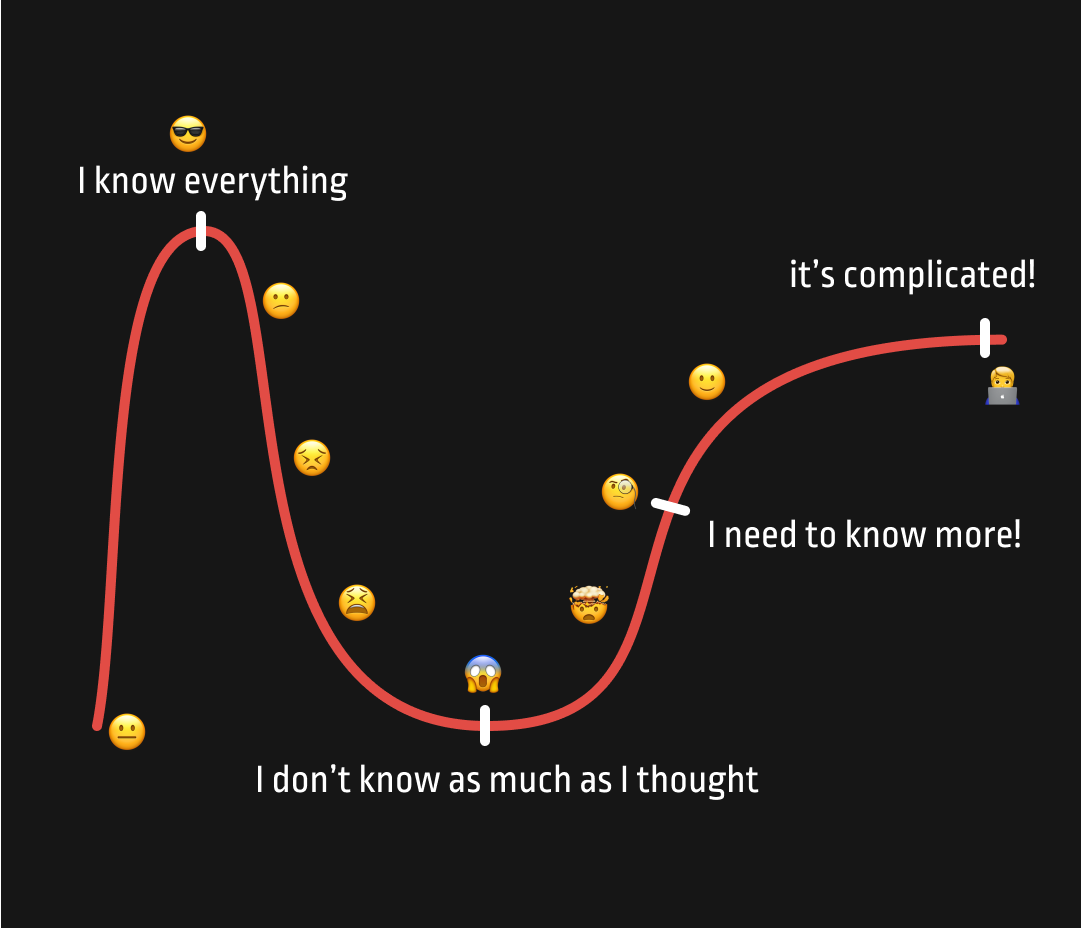
Dunning–Kruger effect: tendency of people with low ability in a specific area to give overly positive assessments of this ability = ability to see themselves as more skilled than they are.
Let's break down the levels of the effect and discuss why people end up at each level and how they can move forward.
Stage 1. Peak of "Mount Stupid"
People start learning something and have a feeling that they already understand everything about the topic. They think, "Why is everyone overcomplicating things? It's easy! Since I understand this, I can explain all the details to everyone."
This is actually a valuable stage – it comes with high motivation to move forward. While every expert began their journey here, the key is to maintain this enthusiasm while continuing to learn and grow.
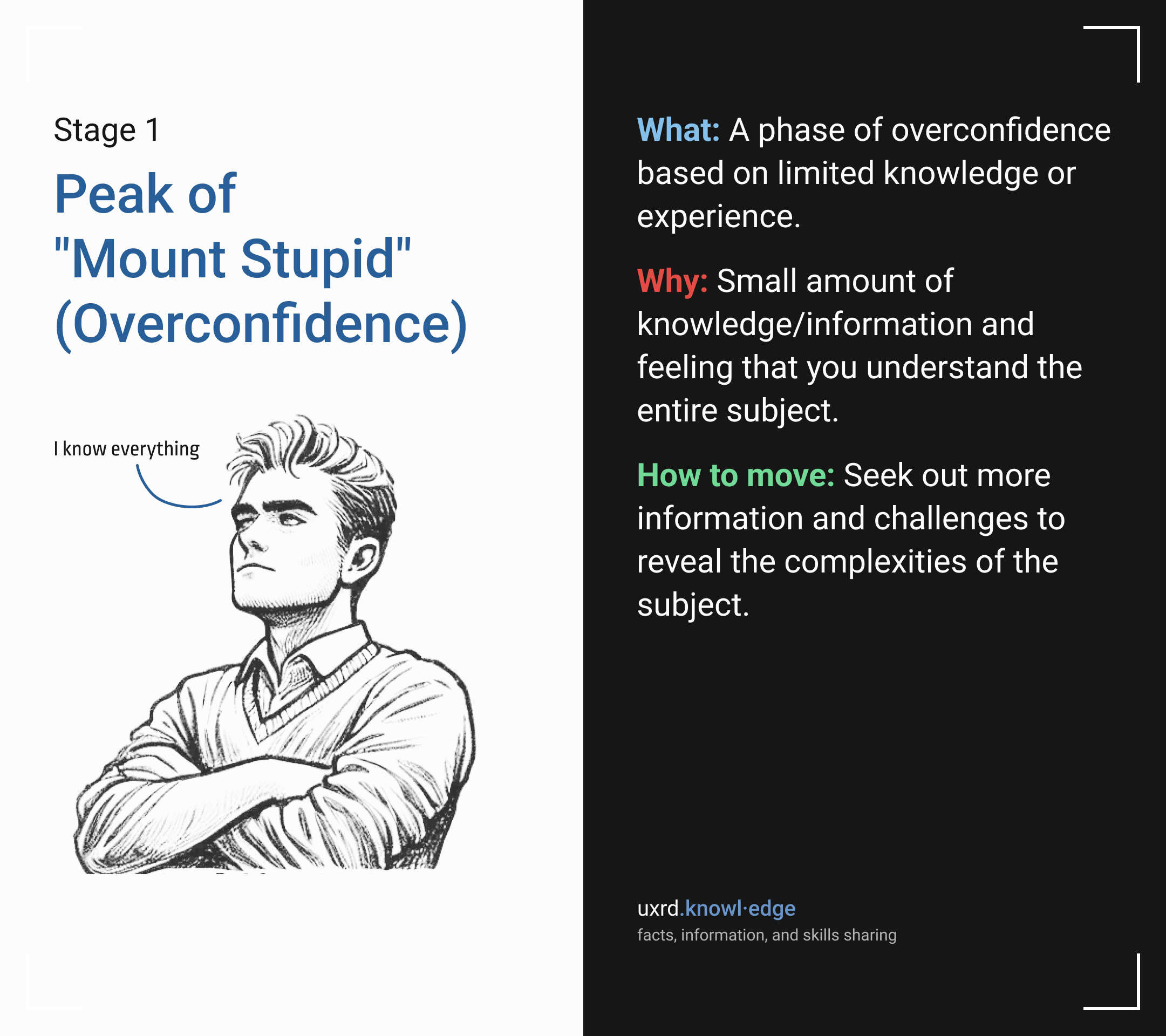
Stage 2.Valley of Despair
hen people continue moving from Stage 1 and learn more, they start realizing that not everything is as simple as it seemed in the previous stage. More information gives better understanding and reveals how much you actually need to know.
This is the most dangerous stage, as you might give up because your confidence goes down and you realize how naive your previous answers or solutions were.
But here's the important thing: if you look back and your previous work seems not as good as it should be, it means only one thing - you are growing. You know more right now, and that's a good thing. It's a process, just keep going - you're doing a great job!
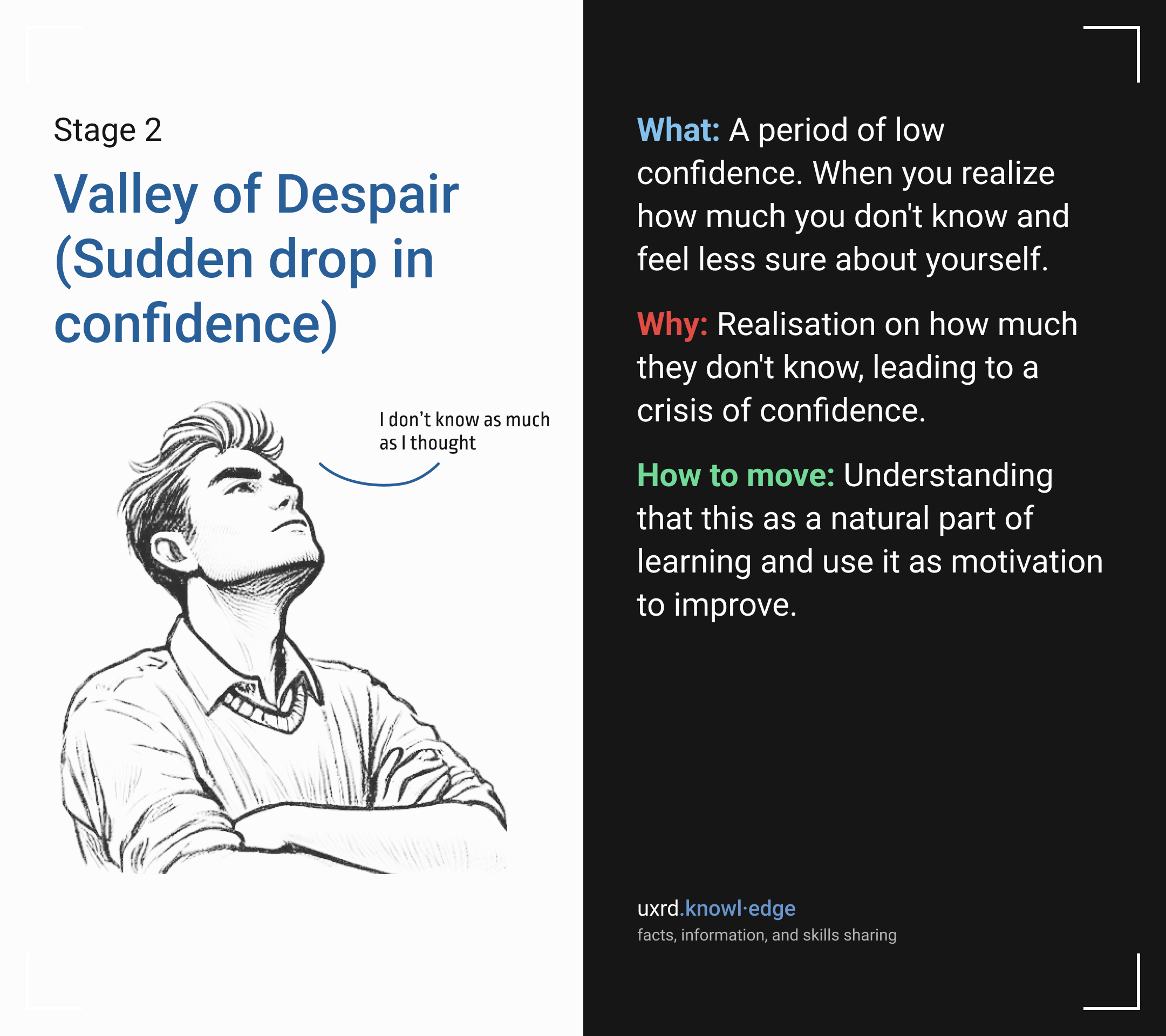
Stage 3. Slope of Enlightenment
This stage comes when you didn't give up at the previous stage and continue learning, gaining more stable understanding and growth. While it's a positive stage with increased confidence and knowledge-based decisions, there's a risk: feeling stable might slow down your learning. The key is to keep learning and stay aware of what you still don't know.
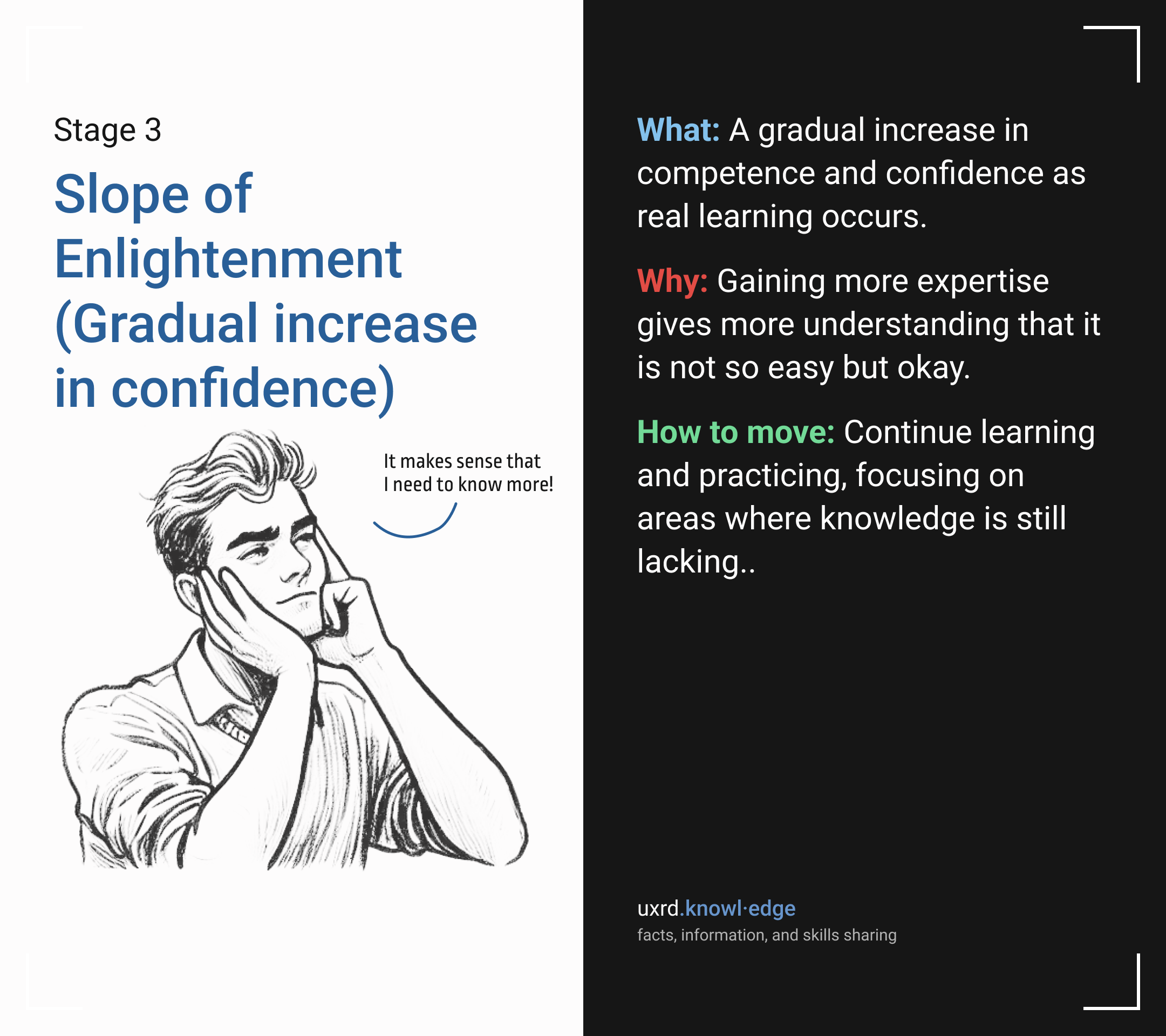
Stage 4. Plateau of Sustainability
This is the stage of realistic assessment of abilities, where people understand that they will never know everything and that topics are inherently complex. You learn to view information from different perspectives and aren't afraid to ask questions when needed, being comfortable saying "I don't know" or "I need to research this."
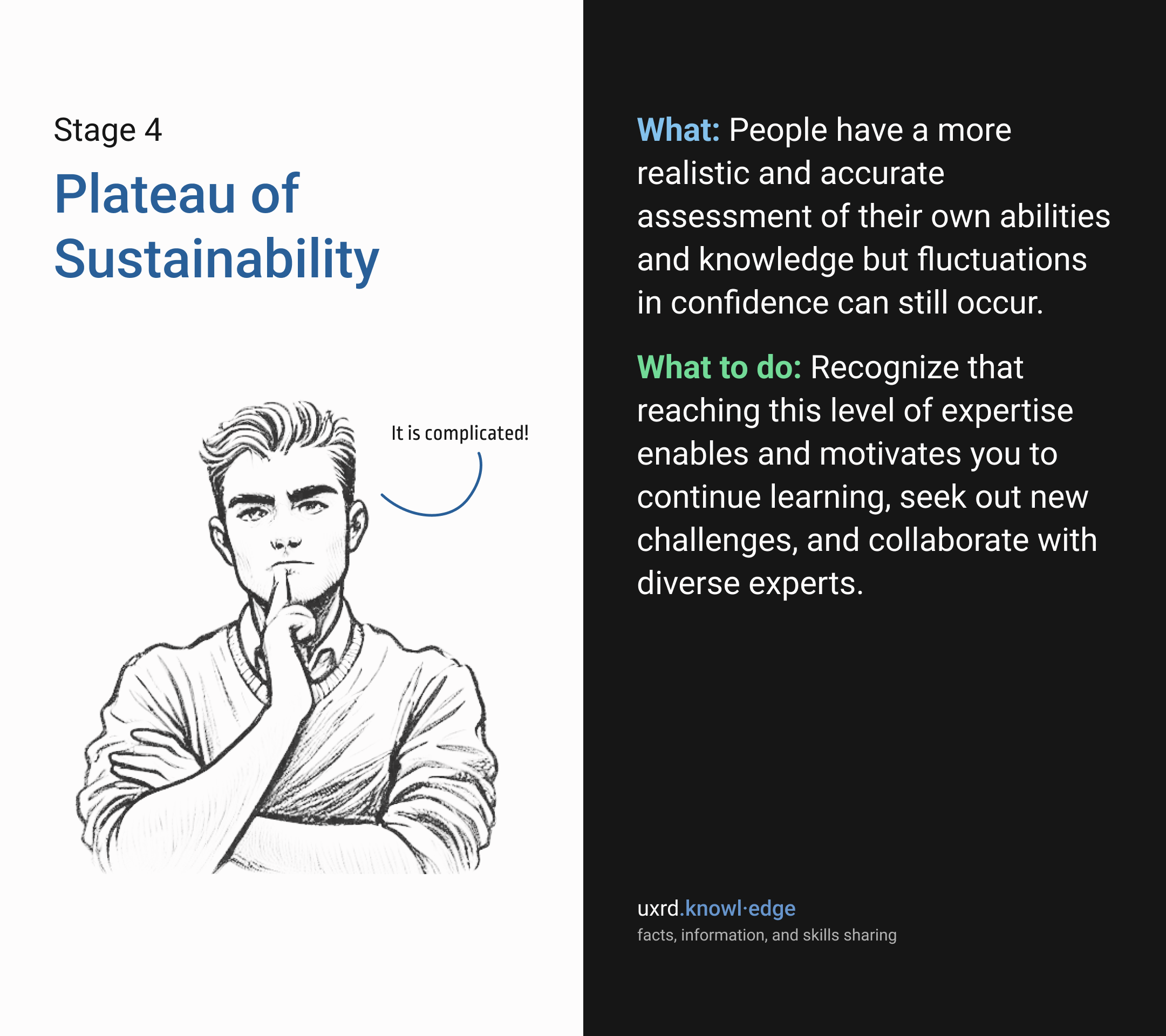
"I know that I know nothing" Plato
The Opposite Effects in Stage 4
On the last stage of Dunning-Kruger effect, people can face two opposite effects of their expertise. Both stem from the same source - knowledge, but affect different areas: how you understand your own abilities and how you relate to people with less knowledge.
Personal Understanding: The Imposter Syndrome Effect
When information becomes "obvious" to experts, they tend to underestimate their own knowledge and abilities. This leads them to undervalue their expertise and feel less qualified than they truly are.
Understanding Others: The Curse of Knowledge
Experts often struggle to relate to beginners because they've forgotten their own learning journey. All information seems easier to understand than it actually is, making it difficult to see things from a beginner's perspective.
How this information can help in your career?
Understanding Your Knowledge
It's beneficial to recognize which stage you're at, since each has its positives and negatives for your career growth. I think, the second stage is the most dangerous as you might stop moving forward. However, to reach this stage, you need to get through the first phase, which can be challenging when self-confidence blocks you from being open to new information.
Remember that we live in a fast-growing and changing world. At any stage, it's beneficial to keep learning through books, articles, news, courses, and podcasts. Find people who can drive and motivate you, and don't be afraid to experiment. Do everything to keep moving forward.
Understanding Your Users
When interviewing users, consider their background. New and experienced users provide different insights, and it's important to validate feedback based on this.
Here's an example: a new user (1 month of experience) suggests changes. Dig deeper - are they comparing to previous products? Will their view change with more experience? Take time to validate and ask questions.
Remember: new users often spot details that experienced users no longer notice, having lost their fresh perspective. Both viewpoints are valuable - they just show different sides of the same product.
Dealing with 'Everyone's a Designer' Syndrome
People often think UI design is easy - after all, we all use digital products daily. After reading a few articles, many feel like experts: "It's just adding a 'delete' button, right? What's complex?"
For designers, understanding this effect becomes a superpower. Instead of getting upset, empathize! People's involvement shows they care and are excited. Use this opportunity to collect information by asking why they want certain changes. You'll often discover valuable insights! This situation actually creates great opportunities for design education and building trust with stakeholders. When people feel involved, they're more likely to support and champion your work.
Just remember to provide clear reasoning for your decisions and explain your design choices. Use this as a chance to share your design process. Show how decisions aren't just about personal preference.
Remember that everyone started somewhere. Your role isn't just to design interfaces but to help others understand good design principles too.
Keep learning, keep growing and stay motivated!



